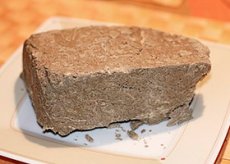Medical expert of the article
New publications
Halva in pregnancy
Last reviewed: 04.07.2025

All iLive content is medically reviewed or fact checked to ensure as much factual accuracy as possible.
We have strict sourcing guidelines and only link to reputable media sites, academic research institutions and, whenever possible, medically peer reviewed studies. Note that the numbers in parentheses ([1], [2], etc.) are clickable links to these studies.
If you feel that any of our content is inaccurate, out-of-date, or otherwise questionable, please select it and press Ctrl + Enter.

Every woman during pregnancy cares about the health of her future baby, so her diet should include only healthy foods. Halva is one of them. Despite its high calorie content, doctors advise including it in the menu of a pregnant woman, as it contains a large number of vitamins and nutrients.
Can you eat halva during pregnancy?
Everyone knows that halva is a high-calorie product. When making it according to the standard, three main components are used - seeds, grated nuts and natural honey. Thus, it is not sugar that makes halva sweet, but a product of bee production. If the expectant mother is not allergic to the listed ingredients, then she can safely eat it when she wants something sweet. Drawing an analogy with chocolate, with the same amount of nutrients, then in terms of usefulness, halva is far superior to it. Of course, not all women in position can indulge themselves with oriental sweets. Those who have chronic diseases, as well as diagnosed with diabetes, halva during pregnancy is strictly prohibited. Women with pancreatitis, cholecystitis, as well as with various types of liver and gallbladder diseases will also have to give it up, since there is a risk that the body will not be able to digest such a heavy product. If excess weight has appeared during pregnancy, then halva can only worsen the situation, like other sweets. A pregnant woman should stick to moderation in the consumption of all products. In the early stages, the permissible volume is 50/100 grams, but then it is better to reduce the portion to 30 grams. It is important not to forget that halva cannot be combined with dairy products and sweets, otherwise this will create an additional burden on the digestive organs and can harm the body.
Sunflower halva during pregnancy
The most common type of halva that you can find on the shelves of our stores is made from sunflower seeds. It is the leader in the presence of useful properties. It contains B vitamins, which will help keep the skin of the expectant mother fresh and clean. Hair will become shiny and the process of hair loss will stop. Sunflower seeds are also rich in vitamin D, during processing it has not lost its functionality and will still be able to strengthen the bones and teeth of a pregnant woman, and will also have a positive effect on the skeletal system of the child. It will help improve sleep and overcome depression during this period. An element such as magnesium will have a positive effect on muscle mass, affecting its strengthening and growth. Its effect is reflected in the work of the cardiovascular system. Thanks to magnesium, pregnant women's blood pressure returns to normal. It is also an excellent protection for the fetus from free radicals. Thus, halva during pregnancy will become not only a healthy treat, but also a way to overcome many diseases.
Halva during late pregnancy
If the expectant mother's diet included halva during the entire period of bearing a child, and no problems or malfunctions in the body arose, then in the last months you will still have to give up the delicacy. Since nuts and honey are allergens, they can cause a tendency to allergies in the baby. Choose products that can replace halva during pregnancy, because the health of the future child is at stake, and what could be more important.
Benefits of halva during pregnancy
Halva has many varieties. Its beneficial properties depend on its constituent components. Thus, halva made from sunflower seeds, the most common type, is rich in vitamins F1, PP and B1.
Peanut halva will help the expectant mother cope with stress and improve memory, as it contains linoleic acid, vitamins PP and B2.
The lowest-calorie is almond halva. And at the same time, it contains a lot of vitamin D, which will prevent the mother from getting caries, help cope with bone pain and prevent calcium loss. It is also extremely important for the future baby, since it will affect the correct formation of the skeleton.
Halva made from sesame is rich in zinc, phosphorus, B vitamins, calcium. With it, colds and headaches are not scary.
In practice, it has been proven that halva during pregnancy helps improve the functioning of the gastrointestinal tract, maintains the hemoglobin level of both the mother and the child. And folic acid is necessary in the early stages of pregnancy, as it restores the genetic material of cells, preventing fetal malformations. And it also helps to cope with a bad mood.
 [ 1 ]
[ 1 ]

